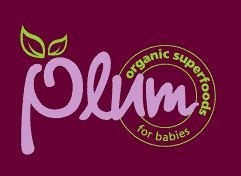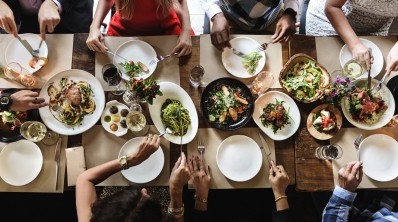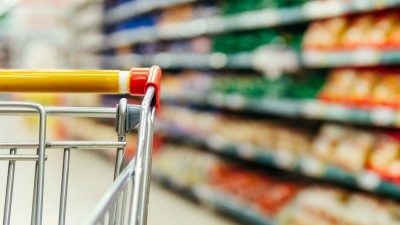Coronavirus and Brexit ‘biggest challenges’ facing food sector: Mission Ventures founder Paddy Willis

Mission Ventures, which has been trading since 2015 as Grocery Accelerator, offers expert business advice, expertise and financial investment to help innovative food and drink start-ups succeed in UK retail. It was founded by seasoned food entrepreneurs Paddy Willis of Plum Baby; John Stapleton, of New Covent Garden Soup and Little Dish; and Nigel Parrot of Ape Snacks.
The start-up veterans, who have launched and successfully exited their own brands for proceeds in excess of £50m, want to ‘help transform the food industry one challenger brand at a time’ by co-developing strategic plans to align with corporations, overseas agencies and funds.
“Mission Ventures are aiming to bridge the gap between start-up entrepreneurs and the more established food industry, both in retail and brand ownership. We want to reduce failure rates for promising innovative products and help them to scale more effectively – thus helping to transform the industry in the process,” Willis told FoodNavigator.
Mission Ventures is more than an investment vehicle – it provides a package of support that draws on the ‘many years’ of experience the trio of founders have accrued in the food and beverage space, running ‘the UK’s leading independent food and drink accelerator programme’ and as founders themselves.
Building business resilience
According to Willis, Mission Ventures has developed a unique process to evaluate businesses and – where needed – build resilience and prepare for accelerated growth.
“Our intensive MissionMap process is designed to strip a business to its component parts and – where necessary – rebuild it to ensure that it is fit for the road ahead. During the acceleration phase of the MissionMap process we continue to work closely with the brand owner to help them to scale and meet their full potential,” he explained.
“Much of this support is practical and industry-focused, but it also includes the arm around the shoulders that founders need on the dark days when things don’t go to plan (and they won’t!). There’s little they will face that we’ve not experienced ourselves on the front line of entrepreneurship.”
Troubled waters ahead: Coronavirus and Brexit
An arm around the shoulders – as well as a hardy business plan - could be particularly necessary in the near term, with coronavirus and Brexit standing as two near-unprecedented challenges to SMEs.
Willis said these two issues are the biggest challenges currently facing the food sector.
“The full impact of either is yet to be determined to our industry, especially for the smaller brands, but inevitably it is the uncertainty that creates issues, be that around investor confidence or supply chain challenges.
“Everyone needs to have a contingency plan, but for most SMEs that is often a cast of 'getting on with it' and riding the bumps in the road. Resilience is a core attribute that each entrepreneur needs in spades.”
Nevertheless, Willis believes that the current market also presents challenger brands with new opportunities to make their mark and take share from larger brands. Digital developments have been a game-changer for smaller brands, he reflected.
“The growth in online shopping is a helpful driver for small brands. There’s a great opportunity to build a stronger relationship with consumers who want to understand the value of your brand and buy into the provenance and relationship that you are able to offer them in a way that big brands struggle to achieve. Testing ideas for NPD is always best achieved, and most cost-effectively, with your online fans.”
‘Great innovations’ driving disruption
The rise of online sales and social marketing has fuelled a shift in consumer behaviour as ‘people who either are unhappy to settle for what’s on offer or who are driven by personal need to adapt an existing product to suit their dietary needs’ look outside the box for inspiration.
Elevated consumer expectations and the ability for small brands to develop direct relationships with their customer base have ‘driven great innovation’ Willis contended pointing to the ‘huge ramp-up’ in quality in the free-from sector over the last five years.
“They’ve successfully transitioned (most of them) from ‘worthy’ to ‘tasty’,” he suggested
“We also see this in the rapid roll-out of new no- or low-alcohol beers and spirits, which is leading to the bigger retailers and brand owners developing dedicated teams and displays for what was traditionally always the poor cousin in any portfolio.”
Willis does not expect the pace of disruption to slow and he believes smaller brands will continue to drive the charge thanks to low barriers to entry.
“Big Food still has development cycles and risk aversion policies that mean it is often easier - and less risky - to acquire an up and coming brand rather than try to invent and incubate in-house,” he noted.

And this is precisely where Mission Ventures plays a role. “The corporate venturing model we have developed is designed to help corporate companies to remain focused on their core portfolio whilst putting modest amounts of capital towards smaller brands that we can help to scale to a point where they may be acquired.
"I often say we are like the tutors and governesses of Victorian-era children: The parents didn’t really want to know their children until they graduated from Oxbridge, but they would pay to have them educated and looked after. We do that for large corporates, offering a plug-and-play innovation hub until they’re ready to join the family.”
New partnerships raise ambition
Mission Ventures is expanding its reach in this space and the company has plans to announce new international partnerships and growth strategies ‘shortly’.
Building on a successful pilot in 2019, they are developing opportunities with the Australian food body FIAL, an industry-led, not for profit organisation focused on growing the share of Australian food in the global marketplace.
This will provide support to a number of innovative brands who wish to expand into the UK market, Mission revealed.
“We have already secured four agreements in 2020 with industry and funders to deliver ambitious growth plans for over 20 new challenger brands. The partnership with FIAL acknowledges the value we can add from our collective experience of building and scaling successful brands in the UK.
“We will shortly be announcing a further three very exciting partnerships that not only underpin our growth plans, but reinforce the position we’ve held since 2015 as the UK’s leading food and drink accelerator,” Willis elaborated.
So, what does it take to be a successful challenger brand? Willis believes it comes down to product and people.
“There has to be a good product but there must be a great team. The former you can tweak, including the brand, but it is hard to change someone who is perhaps not really cut out for being coached or lacks the resilience to stay the course. Most businesses will fail within three years. We have a 90% success rate after five years, so we must be doing something right.”



















